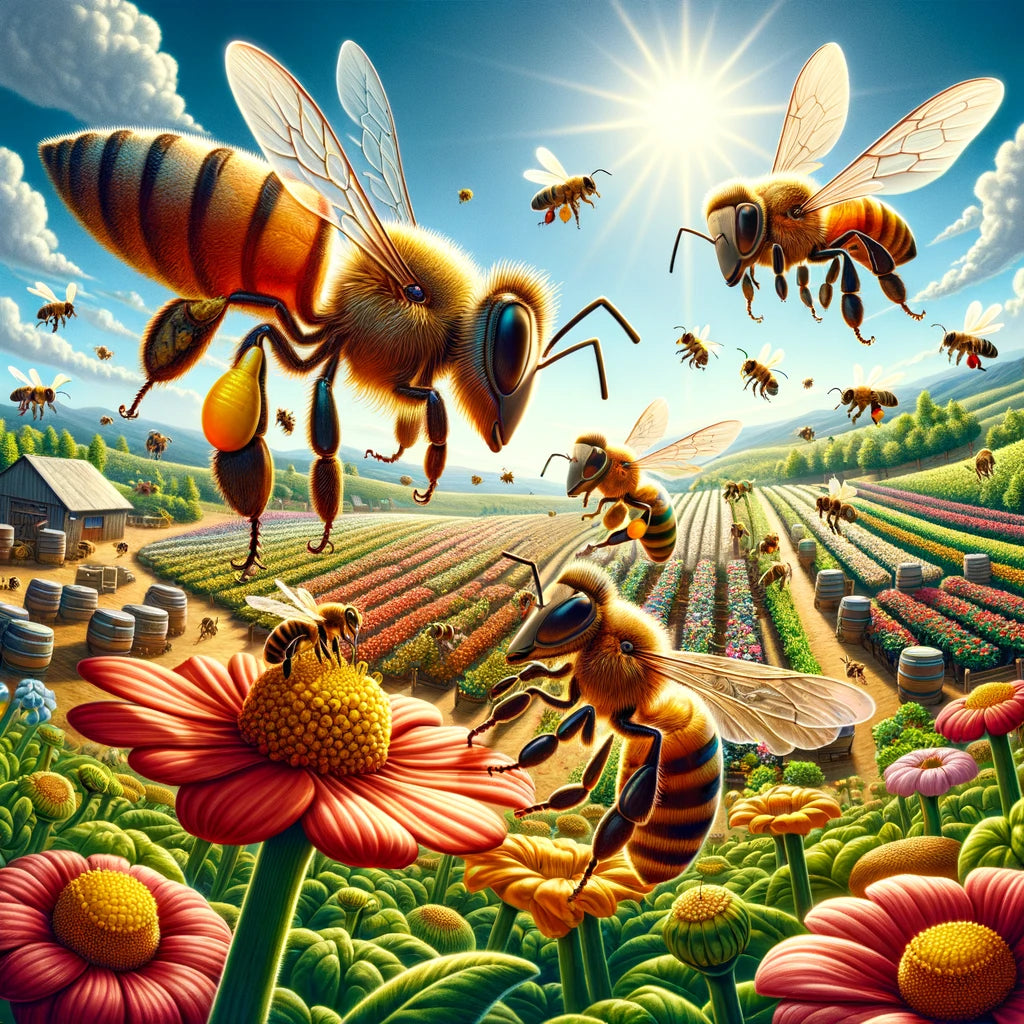Diving into the realm of agriculture reveals the indispensable role honeybees play in sustaining our food systems. As nature's prolific pollinators, they are the linchpins in the intricate dance of crop fertilization, without which many of our tables would lack the variety and nutrition we've come to rely on.
This exploration isn't just about understanding their contribution to agriculture; it's about recognizing their critical position within the ecosystem and the urgent need to support their populations against mounting threats. Join us as we unravel why honeybees are so vital to agriculture and how we can safeguard their future.
The Role of Honeybees in Pollination
Honeybees are master pollinators, visiting millions of flowers to collect nectar and pollen. Their activities are not just about gathering food for the hive; they're a critical part of the pollination process, which is essential for the fertilization of many plants. Here's how they impact agriculture:
- Crop Diversity: Many fruits, vegetables, and nuts depend on bee pollination to produce crops.
- Yield Quality and Quantity: Effective pollination by bees increases the quality and quantity of agricultural produce.
- Ecosystem Health: Bees support the growth of wild plants, fostering biodiversity that benefits entire ecosystems.
The Challenges Facing Honeybees
Honeybees face numerous challenges that jeopardize their health and their critical role in agriculture:
-
Habitat Loss: Expanding cities and monoculture farming reduce diverse food sources and nesting areas, which are critical for bee survival and colony health.
-
Pesticides: Chemicals like neonicotinoids disrupt bees' navigation and foraging, leading to colony weakening and loss.
-
Climate Change: Unpredictable weather and altered bloom times challenge bees' ability to find food, threatening their seasonal feeding cycles.
-
Diseases and Parasites: Pathogens and parasites, notably the Varroa mite, weaken bees' immune systems, causing widespread colony collapses.
Supporting Honeybee Populations for Agricultural Success
Supporting honeybee populations is not just a matter of environmental stewardship; it's a critical component of securing agricultural success and food security worldwide. Honeybees are indispensable for pollinating a vast array of crops, from fruits and nuts to vegetables, ensuring the production of food that sustains both economies and populations. To bolster their populations and protect our agricultural future, several key strategies can be implemented:
- Promoting BeeFriendly Farming Practices: Encouraging agricultural methods that support bee health, such as planting cover crops and reducing pesticide use, can create safer environments for bees to thrive.
- Creating Habitats: Establishing beefriendly habitats with diverse flowering plants provides necessary food and nesting resources throughout the year.
- Supporting Bee Health Research: Investing in research to understand and combat threats like diseases, pests, and the impacts of climate change is vital for developing effective conservation strategies.
- Utilizing Bee Attraction Products: Products like Swarm Commander, which mimic the natural pheromones of queen bees, play a significant role in attracting and maintaining healthy bee populations. These innovations are invaluable for beekeepers and farmers in enhancing pollination and ensuring the vitality of crops.
The Economic Impact of Honeybees on Agriculture
The economic impact of honeybees on agriculture is both profound and far-reaching, underscoring their vital role in the global food supply chain. As the world's leading pollinators, honeybees are essential for the cultivation of a broad spectrum of crops, contributing significantly to agricultural productivity and economic stability. It's estimated that about one-third of the food we consume each day relies directly on pollination by bees, illustrating their indispensable role in agriculture.
Honeybees enhance the yield and quality of crops, directly influencing the agricultural economy. Their pollination services are valued at billions of dollars annually worldwide, highlighting their economic importance beyond the production of honey and beeswax. Crops like almonds, berries, and apples, among others, depend heavily on bee pollination to achieve high-quality produce in sufficient quantities.
The decline in honeybee populations poses a serious threat to crop yields and food prices, potentially leading to increased food scarcity and economic instability. This makes the conservation of honeybee populations not only an environmental issue but a critical economic concern as well.
Investing in bee health and sustainable farming practices can safeguard these essential pollinators, ensuring the continuity of their pollination services and securing the future of our agricultural economy.
Conclusion
The vital role of honeybees in agriculture extends far beyond their work as pollinators. They are key players in maintaining biodiversity, supporting ecosystem health, and ensuring agricultural productivity. With the challenges they face, it's more important than ever to support healthy bee populations. Products from Swarm Commander offer a way to bolster bee conservation efforts, making them an essential part of the solution to preserve these indispensable pollinators for future generations.
Frequently Asked Questions about The Vital Role of Honey Bees In Agriculture
Q: Why are honeybees considered more important for agriculture than other pollinators?
A: Honeybees are highly efficient at pollination because of their foraging behavior and ability to pollinate a wide variety of plants. This makes them indispensable for the pollination of many crops, directly impacting food production and security.
Q: How can individual homeowners contribute to supporting honeybee populations?
A: Homeowners can plant a variety of bee-friendly flowers, provide water sources, and minimize pesticide use in their gardens to create a safe environment for bees.
Q: Can honeybees pollinate all types of plants?
A: While honeybees pollinate many plants, not all plants rely on them. Some species require other insects or methods for pollination, highlighting the diversity of pollination strategies in nature.



